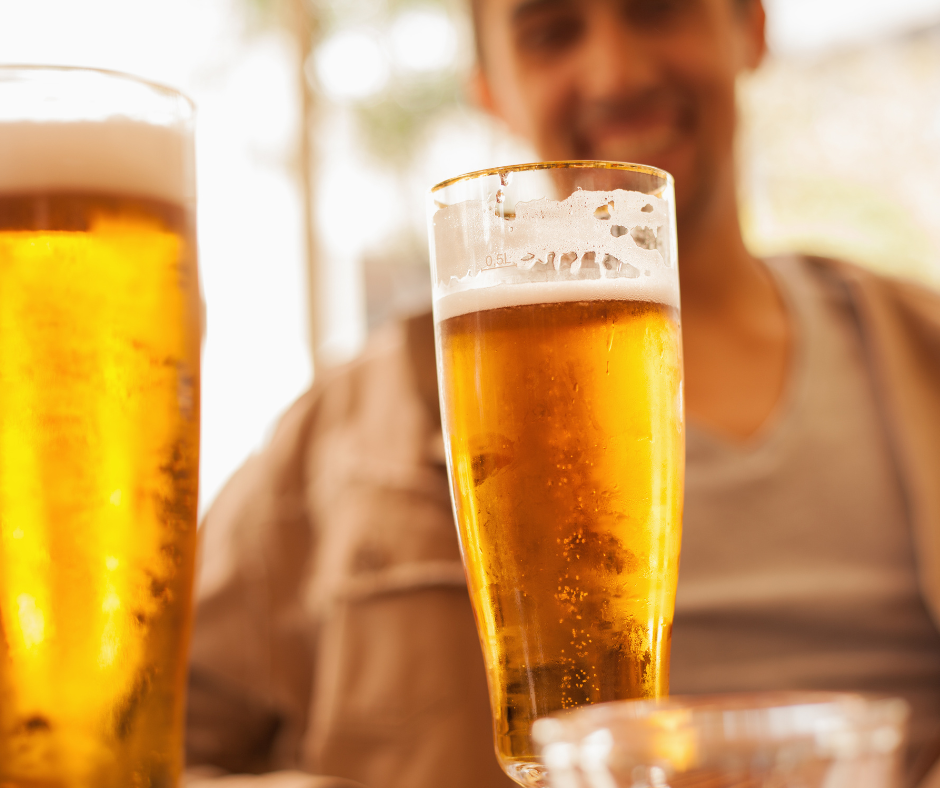How many times have you found yourself uttering the words, “once I start drinking, I can’t stop !” You’re not alone. For many, what begins as a casual drink spirals into a night they’d rather forget. But why does this happen? Let’s unravel the mystery together.
Short Summary
-
Understand the psychological and physiological factors behind excessive drinking.
-
Find alternative coping mechanisms to break free from this cycle.
-
Seek support for a successful journey towards sobriety!
Understanding the “Drinking Once I Start” Phenomenon

The “Drinking Once I Start” phenomenon is like a roller coaster ride without brakes. Once you’ve taken that first drink, stopping seems impossible. The reasons behind this inability to stop drinking once started are as complex as they are fascinating, with psychological and physiological factors playing a significant role alongside the powerful force of habit.
Psychological Factors
Stress, anxiety, and depression are like invisible puppets behind the “Drinking Once I Start” phenomenon. They can exert a powerful pull, leading you to drink more than you had planned. Picture yourself after a stressful day at work. You reach for a drink to unwind, and before you know it, you’re on your fourth or fifth.
But it doesn’t stop there. The social pressure to fit in can nudge you towards the abyss of excessive drinking. You’re at a party, everyone is having a good time, and suddenly, you realize you’ve had more drinks than you intended, leaving you feeling drunk. It’s a slippery slope, and the descent is rapid.
Physiological Factors
On the physiological front, the effects of alcohol on the brain are akin to a puppet master pulling strings. Alcohol releases endorphins, creating a sense of euphoria that can cloud judgment and impair coordination. Imagine being at the wheel of a car with fogged up windows. You can’t see clearly, and your movements are uncoordinated.
Moreover, genetics, tolerance, and alcohol dependence can amplify the struggle to stop drinking. “Twin studies in the US and Europe suggest that approximately 45-65% of the liability is due to genetic factors. ” (Genetics and alcoholism, Howard J. Edenberg, 2014)
It’s like trying to swim against the current; the more you resist, the stronger the pull, making it difficult to be able to stop. And the long-term consequences? They’re as grave as they are varied, ranging from heart disease to liver problems.
The Role of Habit
Habits, the unseen architects of our lives, can deeply influence our drinking behavior. They can form a pattern that’s difficult to break, leading to excessive drinking. It’s like being stuck in a loop; the more you drink, the more ingrained the habit becomes, and the harder it becomes to break free.
When it comes to our drinking behavior, the dynamic between intention and habit plays a significant role. It’s almost like a tug of war – wanting to drink less (especially with the help of Greenville Lantana recovery services), while being challenged by the ingrained habit of reaching for that next drink. To effectively make a change, it’s crucial to identify these patterns and proactively disrupt them before they take a firm hold on us.
Identifying a Drinking Problem

Recognizing the signs of a drinking problem is like reading a road map; it can guide you towards the path of recovery. From physical symptoms and behavioral changes to the impact on your daily life, these signs serve as beacons warning you of the lurking danger.
It is important to be aware of the signs of a drinking problem so that you can take the necessary action.
Warning Signs of Alcoholism
Physical symptoms of alcoholism can be as glaring as a neon sign. Tremors, slurred speech, and impaired coordination are just some of the telltale signs. It’s like watching a performance where the actor stumbles over their lines and fumbles their movements.
Physical symptoms are just the tip of the iceberg. Alcoholism can induce behavioral changes, similar to a puppeteer manipulating a marionette. Mood changes, impaired judgment, inappropriate behavior – they’re all red flags waving in the wind.
And the impact on your life? It can destroy your world, leading to financial difficulties and affecting your career prospects. That’s is why it is crucial to understand the alcohol use disorder and the possible options for its treatment.
The Impact of Alcohol on Daily Life
Alcohol can cast a long shadow over your daily life. It can lead to physical health issues and mental health concerns, turning your world upside down. It’s like a storm cloud looming over your life, threatening to burst at any moment.
The social fallout from alcohol can be just as devastating. It can strain relationships and decrease work productivity, leaving a trail of broken bonds and unfulfilled potential in its wake. It’s like a domino effect; once the first domino falls, the rest follow in quick succession.
Self-Assessment Tools
Navigating the challenging terrain of alcoholism can be daunting, but self-assessment tools serve as a compass guiding you on this journey. The AUDIT questionnaire, the Alcohol Use Disorders Identification Test (AUDIT), and the Alcohol, Smoking, and Substance Involvement Screening Test (ASSIST) can help you chart your course.
These tools are like mirrors, reflecting your alcohol consumption and potential problem drinking. They can help you understand your drinking patterns and identify areas of concern. Armed with this knowledge, you can take the necessary steps towards recovery.
Strategies to Regain Control Over Drinking

Regaining control over drinking may seem like an uphill battle, but with the right strategies, the climb becomes manageable. Setting limits, finding alternative coping mechanisms, and seeking support can provide the footholds you need on this ascent.
These strategies can help you start drinking responsibly, stay on track, and reach your goal of reducing or eliminating your drinking.
Setting Limits
Setting limits on drinking is like drawing a line in the sand. You decide how far you’re willing to go and pledge not to cross that line. It’s about asserting control, refusing to let alcohol dictate your actions.
Staying within these limits requires a combination of strategies. From not keeping alcohol at home to setting a specific number of drinks or days to drink, the key is to stay vigilant and committed to your boundaries. And when temptation beckons, recognizing your feelings and establishing boundaries can empower you to stay on track.
Finding Alternative Coping Mechanisms
Finding alternative coping mechanisms is like discovering a hidden path that can lead you away from the allure of alcohol. Mindfulness, meditation, and physical activity can serve as waypoints on this path, offering respite from the challenges of recovery. From the tranquility of yoga to the adrenaline rush of running, these activities can provide a healthy outlet for stress.
When facing tough times, it’s crucial to remember that reaching out to others can be a lifeline, offering essential emotional support and understanding, just like it has done for countless individuals in the past. During challenging moments, finding expert addiction treatment can also be a crucial step towards healing and recovery.
Seeking Support
Seeking support in your journey towards recovery is like enlisting an army to fight on your side. It can empower you to gain clarity into your behavior and form a robust support network. From behavioral treatments to support groups like Alcoholics Anonymous, the resources at your disposal are varied and plentiful. They offer a lifeline, a safety net that you can rely on when the journey gets tough. The right support can be the difference between falling and getting back up.
Treatment Options for Alcoholism

When it comes to alcoholism, the treatment options are as diverse as they are effective. From behavioral treatments and medications to mutual-support groups, each path offers a unique approach to recovery.
Behavioral treatments focus on changing the patient’s behavior and attitudes related to alcohol use.
Counseling and Therapy
Counseling and therapy can act as a compass, helping you navigate the turbulent waters of alcohol addiction. They provide a safe space to discuss your drinking habits and develop healthier coping strategies instead of quit drinking alcohol cold turkey.
From individual and group therapy to cognitive-behavioral therapy, the options are varied and tailored to your needs. It’s like having a personalized roadmap to recovery, one that takes into account your unique circumstances and challenges.
Medication-Assisted Treatment
Medication-assisted treatment is like a life raft in the choppy sea of alcohol addiction. It can help manage withdrawal symptoms and cravings, provide counseling, and offer behavioral therapies to address the root causes of addiction. Medications like Naltrexone, Acamprosate, and Disulfiram can be powerful allies in your battle against alcoholism. They can reduce the risk of relapse and improve your chances of long-term sobriety.
Inpatient and Outpatient Programs
Inpatient and outpatient programs offer different approaches to the same goal – recovery. Inpatient programs provide a secure environment for recovery, while outpatient programs offer flexibility to balance treatment with daily life.
Both types of programs offer access to a wide range of therapies and activities. It’s like having a toolbox filled with various tools, each designed to help you build a life of sobriety.
Real Stories: Overcoming the “Can’t Stop Drinking” Struggle

The journey to recovery is a personal one, marked by unique struggles and victories. Let’s take a look at a few inspiring stories of individuals who successfully addressed their inability to stop drinking once they started.
Highlighting their turning points, strategies for success, and the lessons they learned along the way can provide insight into how to approach recovery.
Turning Points
Turning points are like lighthouses in the stormy sea of addiction, illuminating the night of despair. They serve as moments of revelation that inspire change and spark the journey towards recovery, especially when reflecting on a year ago.
These turning points could be a realization of the severity of the problem or a commitment to seek help. They serve as the catalyst for change, propelling individuals towards the path of recovery.
Strategies for Success
The strategies for success in overcoming the “Can’t Stop Drinking” struggle are as varied as the individuals themselves. Therapy, medication, and support groups have proven to be effective. From the tranquility of yoga to the camaraderie of support groups, these strategies offer a lifeline in the turbulent sea of recovery and tackle the feeling of tired after quitting alcohol. They demonstrate that with the right tools, overcoming alcohol addiction is not only possible but achievable.
Lessons Learned
The journey to overcoming alcohol addiction is filled with invaluable lessons. One key takeaway is that recognizing a drinking problem is the first step towards recovery.
Another lesson is that alcoholism can have serious impacts on both physical and mental health, and recognizing these potential consequences can be a powerful motivator for change in the life of an alcoholic.
And the strategies employed in this battle? They underscore the importance of setting boundaries, finding healthy coping strategies, and seeking help when feeling deleted.
Summary
In our journey to understand the “Drinking Once I Start” phenomenon, we’ve explored the psychological and physiological factors that contribute to this struggle, identified the signs of a drinking problem, and examined various strategies and treatments to regain control over drinking. But the most important takeaway is this: Recovery is possible. With the right support, tools, and determination, you can overcome this struggle and reclaim control over your life.
Frequently Asked Questions
What is the “Drinking Once I Start” phenomenon?
The “Drinking Once I Start” phenomenon is an inability to resist the urge to keep drinking once you have begun, making it difficult to stop.
What are the warning signs of alcoholism?
Alcoholism can have a range of warning signs, such as physical symptoms like tremors and slurred speech, behavioral changes like mood swings, poor social functioning, and neglecting responsibilities.
These warning signs can be difficult to spot, but if you know what to look for, you can help someone who may be struggling with an alcohol addiction.
If you think someone you know may be struggling with alcoholism, it’s important to reach out and offer support.
What strategies can help me regain control over my drinking?
Regain control by setting limits, finding alternative coping mechanisms, and seeking support.
Take the first step today!
What treatment options are available for alcoholism?
There are many treatment options for alcoholism, such as counseling and therapy, medication-assisted treatment, and inpatient/outpatient programs. With the right help, recovery is possible.
What are some real-life examples of people who have successfully overcome the “Can’t Stop Drinking” struggle?
Stacia Murphy, Beth, and Lucy have all succeeded in overcoming their struggles with excessive drinking, providing an inspiring example for others.
Their stories demonstrate that it is possible to break free from the cycle of addiction and reclaim control of one’s life. They have each found a way to live a healthier, more fulfilling life.
Their stories tell their stories.









